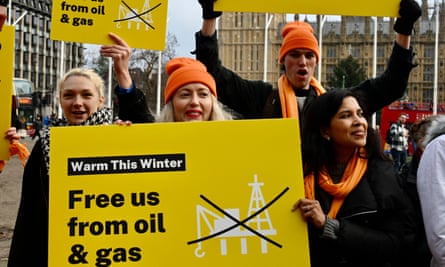A single new oil and gas field in the North Sea would be enough to exceed the UK’s carbon budgets from its operations alone, analysis has shown, as the government considers fossil fuel expansion despite the legally binding commitment to net zero.
Rosebank is the biggest undeveloped oilfield in the North Sea, with the potential to produce 500m barrels of oil, and has already cleared several regulatory hurdles, meaning a decision on its future could come soon.
But analysis by the campaigning group Uplift has shown that the likely emissions just from producing oil from the field would be enough to exceed the share of the UK’s carbon budgets that should come from oil and gas production, from 2028 onwards.
That would mean other sectors of the economy would have to cut their emissions further and faster to enable the UK to stay within its carbon budgets, if the Rosebank field went ahead.
The findings raise further questions over the government’s plans to push ahead with the development of oil and gas despite pleas from scientists and the UN to halt new licences. Ministers are in the midst of a new licensing round for oil and gas in the North Sea, and this is expected to continue despite the net zero strategy. The government’s energy security and net zero strategies, running to more than 1,000 pages, were unveiled on Thursday. They contain a major gamble on carbon capture and storage (CCS) technology, which will receive £20bn of government support over 20 years, and which ministers said would allow for continued fossil fuel use.
But scientists told the Observer that using CCS in this way was a dangerous gamble, and that calling off any proposed new development of oil and gas was a safer way to meet the net zero commitment.
The Rosebank field, to be developed by the Norwegian state-owned energy company Equinor, is about three times the size of the Cambo field, which was the subject of intense campaigning before being paused last year.
The emissions from Rosebank’s operations alone – not counting any emissions from burning the oil and gas it is likely to produce – are likely to reach 5.6m tonnes of carbon dioxide, according to analysis by Uplift of the environmental statements provided by Equinor.
This would be enough, when added to the emissions from the operations of existing oil and gas fields, to exceed the amount of emissions that should be allowed to come from the UK’s oil and gas sector, within the UK’s total carbon budget, from 2028.
Counting Rosebank’s likely emissions, oil and gas production would exceed its theoretical share of the UK’s fifth carbon budget, from 2028 to 2032, by about 8%, and exceed its share of the sixth carbon budget, from 2033 to 2037, by about 17%.
The carbon budget is not formally divided up among emitting sectors, but the Committee on Climate Change provides guidelines suggesting that various sectors should stay within approximate limits. By this reckoning, North Sea oil and gas operations should account for only about 4% of the UK’s carbon budgets, which run for five years each and have so far been set out to 2037.
Tessa Khan, executive director of Uplift, said: “This analysis clearly shows what the government has long known but chosen to ignore: that it is impossible to reconcile approving a huge new oilfield like Rosebank with the UK meeting its climate obligations.”
She pointed out that the development could be eligible for £3.57bn in tax breaks under the windfall tax, which hands companies incentives for investing in increased oil and gas production.
“Ministers also know that approving Rosebank will do nothing to lower UK fuel bills and will do very little for UK energy security as most of these reserves will likely be exported. On every level, including legally, Rosebank fails.”
Ed Miliband, Labour’s shadow secretary for climate and net zero, said: “After the miserable failure of ‘green day’ confirmed that the Conservatives will never meet Britain’s energy needs or create the clean jobs of the future, the idea that they are about to throw billions at new fossil fuel exploration shows that they will scandalously waste money on climate vandalism. The evidence is clear: Rosebank will do nothing to cut bills, as the government admit, is no solution to our energy security, and would drive a coach and horses through our climate commitments.”
Grant Shapps, secretary of state for energy security and net zero, said at the launch of the government’s Powering Up Britain strategy on Thursday that a decision on Rosebank was “not on my desk”.
He defended the continued licensing of oil and gas, despite a plea by 700 scientists last week for the UK to halt new development, and the urging of the UN secretary general, António Guterres, for countries to forgo fossil fuel development and reach net zero by 2040.
A spokesperson from the Department for Energy Security and Net Zero said: “We are on track to deliver our carbon budgets, creating jobs and investment across the UK while reducing emissions. Our carbon budget delivery plan is a dynamic long-term plan for a transition that will take place over the next 15 years, setting us on course to reach net zero by 2050.”


